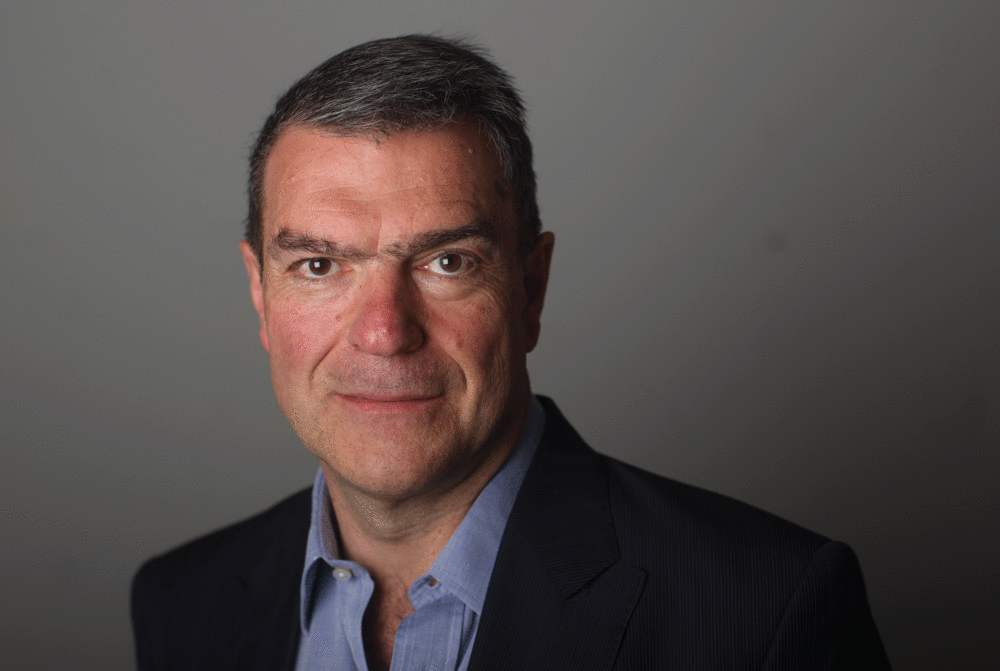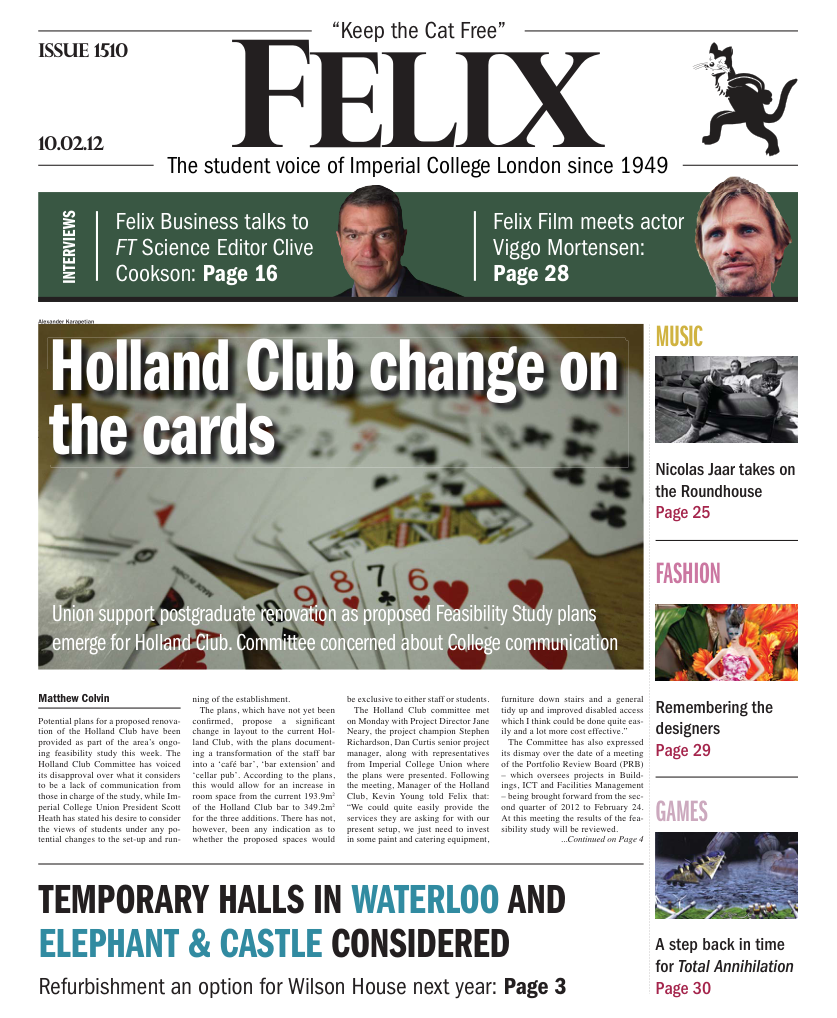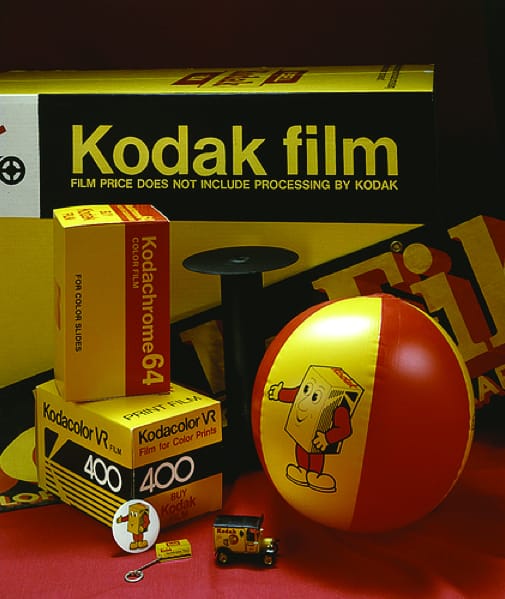Reporting Science in Financial Times
Felix Business Editors Benat Gurrutxaga-Lerma and Nina Kearsey talk to Clive Cookson, Science Editor at the Financial Times, about the argument for business involvement in science, and about the challenges and changes facing science journalism

To begin, as interviews commonly do, with some scene-setting by way of a weather report, it was a cold albeit sunny morning (one of those ironies so common to the English winter) when we met with the Financial Times’ Clive Cookson to talk science and business. Both a scientist and journalist by training, Cookson’s work for the FT has involved writing everything from blogs and podcasts to teeline shorthand. Thus embodying both the new- and old-schools of journalism, he is well placed to share his thoughts on the changing status of science and science reporting. Retreating from the unremitting cold of the winter anticyclone to RCS1, and with coats still drawn around us against its lasting chill and the capricious air-con, we began the following conversation.
Felix Business: The Financial Times is a specialist, financially oriented newspaper. Having established itself as the friend of “The Honest Financier and the Respectable Broker”, with a strong focus on business and economics, why does it need a science editor?
Clive Cookson: Well, the narrow answer is because so much business is science based. Everything from the pharmaceuticals and biotech industries through to materials, chemistry and electronics; computers, IT; all those have, ultimately, a base in science – so that’s the answer to why a business newspaper needs a science correspondent. But the broader answer is that the FT is not any longer just a business newspaper. We also have Arts sections, and we write about science as science: I write about cosmology and the origins and future of the universe – that has no immediate business applications. So in summary, a business newspaper would need a science correspondent, but we also cover non-business topics.
FB: That begins to answer our second question, which was that the general public has this view of science as connected to the manufacturing industry and high-tech companies. But does it still carry the same relevance as the economy shifts from products towards services?
CC: Well the government of course would like to base future economic growth on science based companies – the famous “rebalancing” phrase. Too much has been tilted towards particularly financial services, and they want to put some back. Not into old-style dinosaur manufacturing industries, but into the new-style science based companies.
FB: Would you then agree that manufacturing and R&D should carry a more prominent role in the UK economy?
CC:I think so. Given that we have a highly-skilled, highly-educated workforce and a good science base, and excellent universities like this one producing people who could do this, and considering companies based on science have a much higher value added per-person than others, it makes sense to base the future on it, yes.
FB: On that point, what do you think of City firms poaching science graduates away from engineering and high-tech firms? Do you think that the lure of the high salaries these have to offer is distorting the UK economy?
CC:I think it was doing so, but that now there is going to be much less of that because City firms are not growing to the same extent – some of them are laying off people. So I think that’s a problem of the last decade; it’s less of a problem for future decades, or this decade. But I actually think it hasn’t been bad for the whole field because there is an uplift: if physicists and engineers and mathematicians can get vast salaries in the financial industry, that forces other employers, like old-style technological industries such as Rolls-Royce, to pay more than they otherwise would. I would say that it has been good for science and engineering because it has produced an uplift for salaries throughout, which would be even lower otherwise.
FB: Concurrent to this change in economic landscape here though, there seems to have been a change in the time-scales associated with investments. Speculative trading is a notorious example of short-termist thinking, and this is in stark contrast with the returns on R&D expenditure: for instance, the return time on a jet engine is 25 years. How can investment in R&D, being so long-term, be encouraged in an environment where you can make money in seconds?
CC: Well, I would put it a different way, because although the trading itself is very short-term, remember there’s R&D behind that as well. The trading algorithms and so on are not thought up in seconds; they take years of underlying research, and scientists who went into the City have contributed to that. So I think it is a mistake to look at everything in financial trading as being short-term, when the underlying strategies have probably been thought up over several years – not as many years as a jet engine or a pharmaceutical product, but they are not as short-term as it might seem. In terms of what you can do about it, there’s nothing you can do about it in a capitalist, free-market economy, absolutely nothing. You can juggle with the tax system so that, as they do in America, you pay more capital gains tax on an asset you have held for less than a year than for more than a year. You can try and fight short-termism in that way, but fundamentally it is just part of the system we live in.
FB: Do you think the different time-scale associated with investments for a company like Rolls-Royce hampers the way it spreads its finances – having to set aside large amounts of capital that aren’t going mature for decades?
CC: I don’t think so. Remember that Rolls-Royce and the big pharmaceutical companies have, for the last few years, been very profitable. I think that there’s a very good cash flow in these companies; for example in Rolls-Royce’s case from maintenance, or more importantly selling spares for their engines. And the whole thing is geared up for the long-term. They are making money now out of investments they made 25 years ago; the cash is coming in.
FB: Doesn’t that create a barrier for new businesses to start up in those kinds of industry?
CC: Oh yes, it’s a huge barrier. In the aerospace industry, for example, it’s a very big barrier to starting up, which is why there haven’t been any successful start-ups in that particular field. At least not in Europe.
FB: What about the political timetable? Because that’s also quite short-term. Do you think scientific development requires more constancy than it gets in terms of government policy?
CC: Yes, I do. Though there’s more continuity in government policy, I would say, in science than in many other areas. In this country there is not a big party-political difference: Labour science policy and Conservative science policy are, broadly speaking, very similar. I don’t think there are big ideological differences. Yes politics thinks in the short-term, but it’s not a case where one government will tear up what the other one has done.
FB: Would you agree that there is a bias against strong scientific policy due to the backgrounds of government ministers, which are overwhelmingly humanities and social sciences?
CC: Yes. And that’s true more generally of politics and the civil service. Obviously the backgrounds of government ministers reflect the backgrounds of members of parliament in this country, and there are far too few MPs with any sort of science, medical or engineering backgrounds. The same applies to senior civil servants in government departments – there are some, but there aren’t very many. I wish more scientists would go into politics, and non-scientific administration.
FB: So does talk of revitalising the UK’s manufacturing sector require a technocrat minister – someone with a PhD in some scientific discipline?
CC: It doesn’t require it. It would probably be helped, but I don’t think we should despair because these people aren’t around. It’s going to take a generation, if it happens at all, to get more scientifically trained people into these senior government leadership jobs. No, I don’t think it requires that. It would be nice, but not essential.
FB: And do you think that the last reform for higher education, with so much of a focus on science and engineering education, will actually produce that shift towards having more MPs, senior civil servants, or politicians in general, coming from a scientific backgrounds?
CC:Yes. It’s going to be a slow process, but I think it’s part of a general trend – yes. But it’s clearly going to take decades. I think it’s going in the right direction.
On Science Journalism
FB: We now have some more general questions on science journalism. One of the challenges of reporting science, it seems, is to avoid being reductionist in your efforts to communicate technical information to a non-scientific audience; is this necessary, do you think, or should you demand more from your readers? Does it detract in any way from the science itself?
CC: Personally, I think that if you’re writing a science story in a newspaper like the FT for example, for an intelligent but generally non-scientific readership, you should be able to include some details which will not be understood by everyone, and will be understood, and illuminate the piece, say, for scientists. It shouldn’t put off non-scientists. In other words, the piece should be comprehensible to any intelligent reader, but that does not mean that any intelligent reader should be able to understand every detail in the piece. You’d never get anywhere if you had to spell out all the details. I am a great believer in pieces that can be read by everyone, but will not be so over-simplified for the scientist.
FB: What of the different vocabularies used? The scientific training provides a very different working vocabulary – for example those cases in which journalists ask astronomers whether there is a chance of a meteorite hitting the Earth, and the scientist would say, “Well there is a 99% chance that it won’t hit the earth, but...” and immediately the journalist asks, “But is there a chance?” – “Well, I can’t assure it won’t happen...”. Obviously, when that word is said in a scientific context it would denote that the chances are it will never happen. But said in a general context, without the implied scientific caution, it may give the impression to the general public that there is a fair chance of a meteorite hitting the Earth.
CC: I agree there is a different vocabulary, not just in terms of technical terms, but even just the way everyday words are used, which journalists sometimes don’t get. I’ve learnt to interpret this for the public in a way that will not embarrass the scientists. But some scientists do take it too much to extreme, like quantum physicists, who will say “there is a chance that this chair will levitate itself”. They say that, but in fact there’s zero chance. I would say it’s impossible, but quantum physicists would say it’s not impossible. It depends what you mean by impossible.
FB: Related to that it seems, especially in the US media, that there’s a tendency amongst the public to consider expert opinions merely as opinions and so, for example the educated opinions of climate scientists about global warming is sometimes put on the same level as general opinion leaders with no particular expertise – is this a problem when it comes to science journalism? Is it right that non-experts be given equal platform to experts?
CC: No, it’s very wrong, and certainly at the FT the policy of our editor – all FT editors in my memory – has been that if it’s a science-based issue, the voice of scientists is paramount. If the vast majority of scientists are saying one thing, well, you should reflect that opinion, even if there’s a small number of scientists saying something different. Obviously on climate change there are some scientists, even a few who know quite a lot about climatology, who challenge the orthodoxy. But when the vast majority of scientists say one thing, we follow them. Likewise on the safety of genetically modified foods and other issues.
FB: The BBC tends to take a different opinion, in that it will try and present all views – to not really side with anyone. And there are these Newsnight style panel debates where you’ll have the creationist sitting opposite the expert in evolution. Do you think that’s damaging to the scientific message, having these very polarised debates?
CC: Yes, I think it is damaging. For example, on the issue of climate change, climate sceptics regard the BBC as being very much against them, very much the voice of scientific orthodoxy. Whereas from the point of view of most scientists, the BBC gives too much weight to the skeptics. The BBC is particularly exposed, and on this sort of debate it just can’t win. I rather sympathise with them on this. Yes, they give probably too much voice to very minority views, but in their position they have to really.
FB: Do you think the social media and the blogosphere are, in part, responsible for the laudation of non-expert opinions? Are they affecting science journalism?
CC: I think they are affecting science journalism, but I think things are getting better. When blogs were quite new, a lot of weird stuff was going out there. Now that it’s so easy, there are more scientists in the blogosphere, so there’s more of a weight of sensible scientific views than there used to be. I think that balance is tilting back towards science. There’s just so much there! So many scientists are taking part I think things have got better.
FB: Most of the science journalism news are reports about scientific discoveries. I wonder if you’d agree that engineering as a discipline doesn’t get that much of a covering in general?
CC: Yes I agree.
FB: For example a mobile phone is something that people take for granted, but when you actually study what’s inside them, you find something preposterously complicated and sophisticated. It seems that that people do not get to appreciate, in the same way as with science in general, how much work and how many breakthrough discoveries are involved engineering as a field.
CC: What you have said is very true. I would say there are two field which are under-reported: engineering’s probably the biggest one, but also the whole of chemistry is very under-reported. It’s difficult to know how to report either of those. I do try. But it’s difficult compared to discoveries in biomedical research or even physics, where there’s more of a sort of gee-whiz factor, a wow factor – particles going faster than the speed of light, or some new step towards curing cancer. Yes it is a fault in the whole system; I think it always has been probably.
FB: But, for instance, in the 19th century writers seemed very excited about new machines that were invented. I don’t know whether we have already taken for granted that technological progress is going to keep happening on an everyday basis, so that now we are not surprised by the amazing feats engineering offers continuously.
CC: Well I think one of the things is that now a lot of the engineering – the basic engineering breakthroughs – are made in companies that don’t want to talk about it; whereas in the 19th century it was more open. Mobile phone companies don’t want to give away secrets really. If you look at the science and engineering that’s reported in the media, the vast majority comes out of universities and public research labs because they want to talk about it whereas the companies only want to talk about it in terms of selling their product, rather than talking about their underlying science and technology. And then also what engineering needs is a sort of Brian Cox equivalent, who can really win over hundreds of thousands, millions of people by popularising it. There isn’t anyone like that in engineering as far as I know. Or chemistry.
FB: Each year there’s a Royal College of Science Union ‘Science Challenge’, which is an essay competition for students here at the college, and one of the questions this year was set by Pallab Ghosh, science correspondent at the BBC. How would you begin to answer his question “What is the role of science journalism in the 21st century?”
CC: That’s a very good question! I suppose the simple answer to Pallab’s question is that science journalism is the medium by which scientists communicate with the general public. So looking at it from the scientist’s point of view, even with the latest technology, very few scientists can get through to very many people. For most scientists, if they want the world to know about their research – and more and more of them do – then science journalists are the best medium, the best means of communication. And you can look at it from the other way around, from the point of view of the general interested reader or viewer or listener. Then you would like to find out about what’s going on through science journalism because the average person is not going to read Nature or Science or any other primary journal, so you’re going to have to use a secondary or tertiary source. For most people, that’s going to be science journalism and the mass media.








